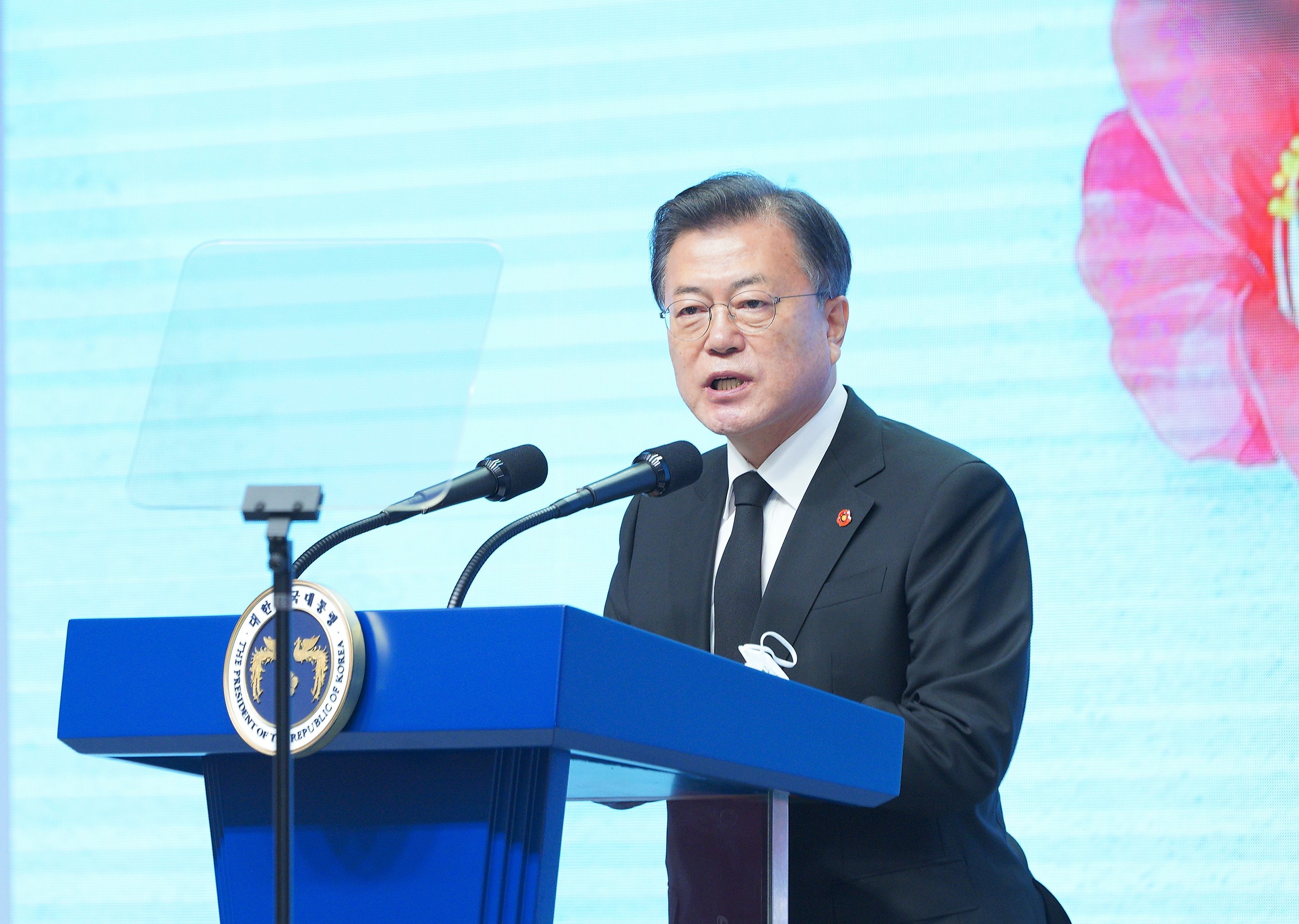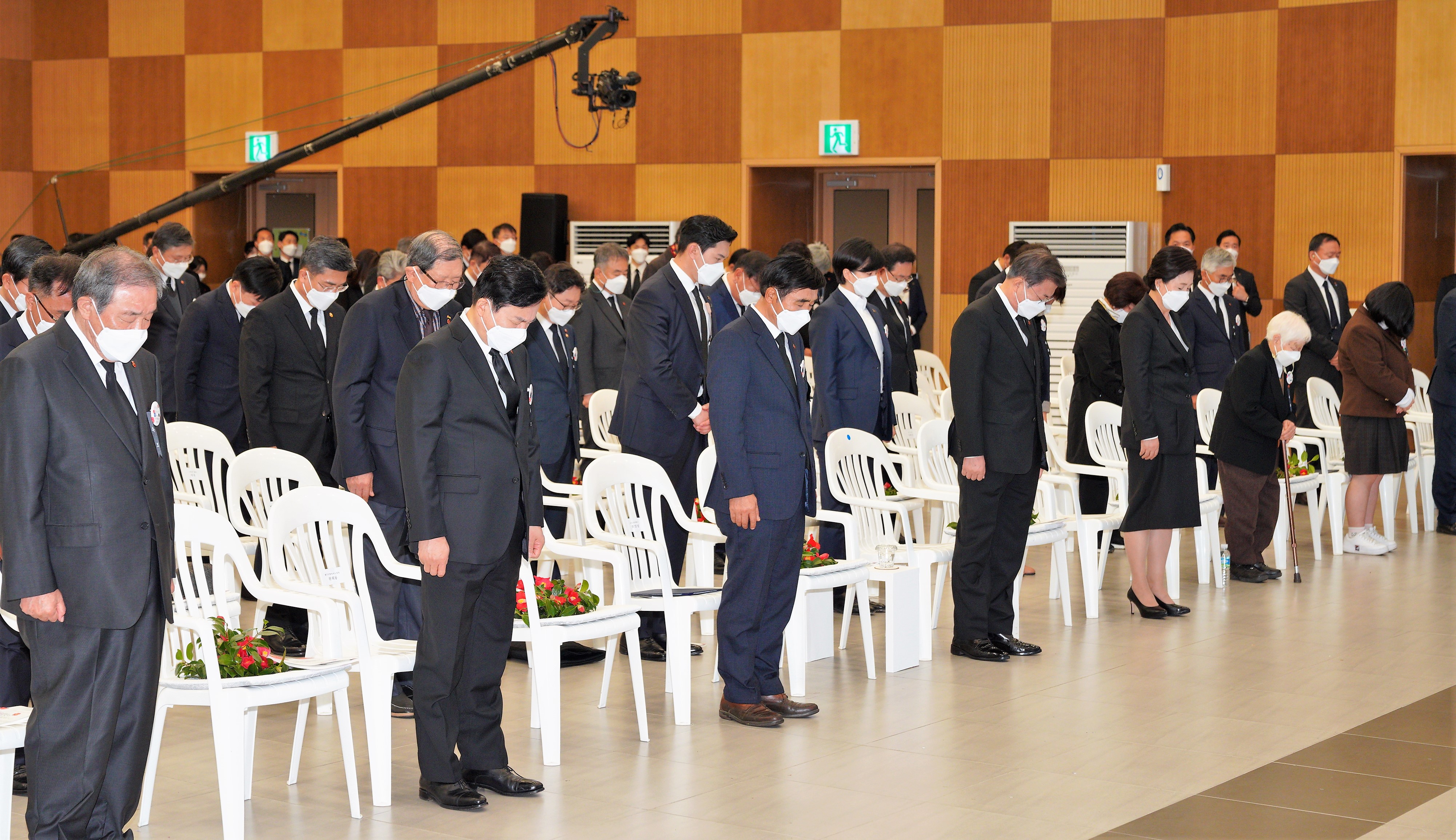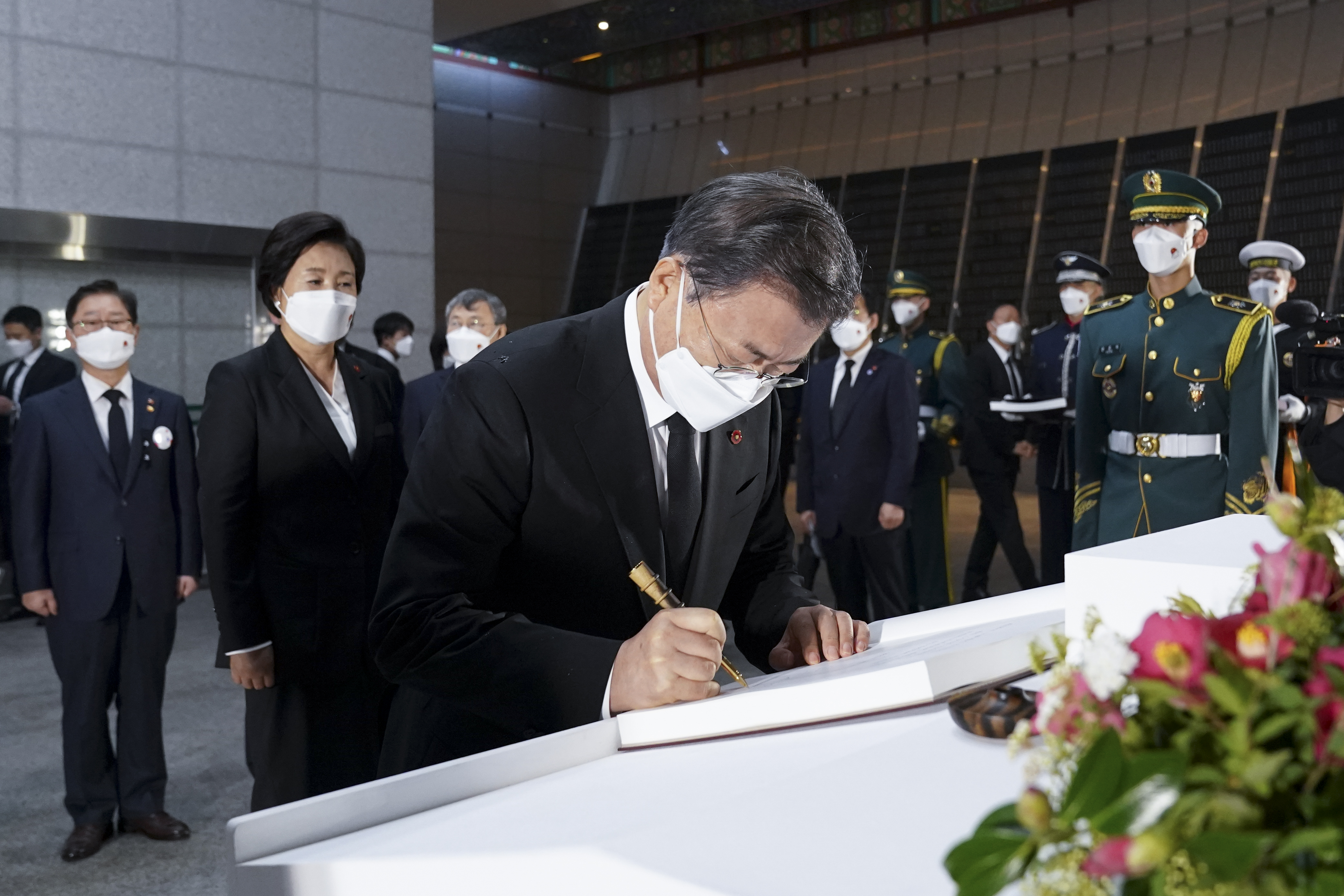The 73rd Memorial Ceremony for the Victims of Jeju 4·3
[Special Report] The 73rd Memorial Ceremony for the Victims of Jeju 4·3
Spring after 73rd Jeju 4·3 Memorial Brings Condolences to Victims
[On-the-ground] President, Defense Minister, Police Chief Attend
Article by Jeju 4·3 Peace Park Editing Team
Photographs by Cheongwadae, Jeju Provincial Office
The spring of the 73rd Jeju 4·3 memorial brought condolences to those who have suffered since the tragic turmoil swept over South Korea’s southernmost island of Jeju. The nation’s COVID-19 situation showed no improvement from last year. This kept at home the bereaved families of the victims, who had expected to be able to attend the memorial ceremony this year.
President Moon Jae-in unexpectedly attended the memorial ceremony for a second consecutive year. His attendance coincided with the National Assembly passing the revised bill on the Jeju 4·3 Special Act on Feb. 26. The president, who had originally pledged to attend the ceremony biennially while in office, stood with respect in front of the souls of the deceased. With his exceptional presence at the event, Moon provided warm consolation to those Jeju people, including victims’ families, who were unable to make it to the ceremonial site.
On April 3 when spring rain drizzled upon the Jeju 4·3 Peace Park, the victims’ families were able to participate in the memorial ceremony by watching it live on television or through the Internet
Presidential revisit to memorial ceremony, following the passing of the revised Jeju 4·3 Special Act
The 73rd Memorial Ceremony for the Victims of Jeju 4·3, hosted by the Ministry of the Interior and Safety and the Jeju Special Self-Governing Province, was solemnly held on April 3, at the Jeju 4·3 Peace Education Center.
The ceremony was held indoors due to rain, while the social distancing rules in place to prevent the spread of the COVID-19 pandemic reduced the scale of the event to fewer than 70 participants, the smallest number of people ever in attendance. The distinguished attendees featured Moon accompanied by first lady Kim Jung-sook. Minister of Defense Gen. Suh Wook and the Commissioner of the National Police Agency Gen. Kim Chang-yong also attended the memorial ceremony on behalf of the nation’s constabulary forces, marking the first time the nation’s military and police heads participated in the memorial event.
The bipartisan list of participants included: Rep. Kim Tae-nyeon, floor leader of the ruling Democratic Party of Korea; Rep. Joo Ho-young, floor leader of the main opposition People Power Party; and Rep. Yeo Young-guk, floor leader of the minor opposition Justice Party. Other high-level officials also attended the event, including: Park Beom-kye, minister of Justice; Jeon Hae-cheol, minister of the Interior and Safety; and Jung Geun-sik, president of the Truth and Reconciliation Commission. Last but not least, the local delegation included: Won Heeryong, governor of the Jeju Special Self-Governing Province; Oh Im-jong, chairman of the Association of the Bereaved Families of Jeju 4·3 Victims; Yang Jo Hoon, president of the Jeju 4·3 Peace Foundation, and other members of the related institutes and organizations.
The memorial ceremony began at 10 a.m. with a siren sounding for one minute in every corner of Jeju Province, requesting a silent tribute to be paid to the Jeju 4·3 victims. The event then proceeded with the screening of a video, the pledge of allegiance and ceremonial salute to the national flag, the recital of a memorial poem during the silent tribute, the screening of the memorial documentary “Traces of Documentation,” the memorial remarks by President Moon, the introduction of a victim’s family, and the memorial performances.
President fully commits to take ensuing measures of the Revised Jeju 4·3 Special Act
Acknowledges Foundation and Trauma Healing Center for healing wounds incurred by victims’ families
In his memorial speech, President Moon expressed “a sincere wish that the pain of surviving victims and bereaved relatives will be washed away by the rain,” while stating that “it is an immense relief to be able to report on the amendment of the Jeju 4·3 Special Act.” The president admitted that “we still have a long way to go,” but promised to “delicately refine and faithfully implement the blueprint, which embodies the aspirations of the souls of those who lost their lives due to Jeju 4·3 and their bereaved families, those who survived Jeju 4·3, and all the other fellow Koreans.”
Moon expressed his gratitude to all those in and out of Jeju Province who have put forth efforts to secure the revision. The president also acknowledged the Jeju 4·3 Peace Foundation and the 4·3 Trauma Healing Center for their efforts to heal the wounds inflicted upon the victims and their families.
“I am profoundly grateful to those involved in running the Jeju 4·3 Peace Foundation and the 4·3 Trauma Healing Center who have worked hard to heal the hearts of the wounded,” he said.
He also promised that once the relevant laws are enacted, “the government will upgrade [4·3 Trauma Healing Center] to a national trauma center and provide support to ensure that the pain felt by many people can be healed entirely.”
The presidential address was followed by the silent tribute paid to the victims. During the silent tribute, Chairman Oh Im-jong of the Association of the Bereaved Families of Jeju 4·3 Victims recited the memorial poem “Until when our 4·3 is remembered as a warm spring day,” written by Jeju-born poet Kim Su-yeol. The screening of the memorial documentary was performed concurrently with another poem recital by Go Doo-shim, South Korea’s established actress from Jeju Island, who read “While you had a mournful spring,” written by Heo Young-sun, director of Jeju 4·3 Research Institute. The introduction of a victim’s family featured Ko Ga-hyeong, a first-year student at Daejeong Girls’ High School and the 17-year-old granddaughter to Son Min-gyu, 87, whose parents and elder brother died during the social unrest surrounding Jeju 4·3. Son’s brother went missing while serving his sentence in the Daegu prison after being convicted by a court-martial. The March 16, 2021, retrial held by the Jeju District Court acquitted him of his false charges.

President Moon Jae-in commits to take ensuing measures of the Revised Jeju 4·3 Special Act.
“Grandma, you said the pent-up sorrow finally started to be relieved,” Ko said. “Now, let me heal the pain left for you. My dream is to become a psychotherapist so that I can offer comfort and help to those who have been hurt in their hearts just like you. I’ll make sure to ease all of your deep sorrow. So you must stay healthy until then. I love you, grandma.”
Son sobbed listening to her granddaughter introduce her story. After Ko’s speech, the president and the first lady offered them words of consolation and encouragement.
The official memorial event ended with South Korean band Sweet Sorrow singing “A Blue Day,” which was originally composed and performed by Song Chang-sik.

Distinguished guests pay silent tribute to the souls of the Jeju 4·3 victims.

President Moon Jae-in signs the Revised Jeju 4·3 Special Act in the Memorial Tablets Enshrinement Room of the Jeju 4·3 Peace Park.
Presidential signing ceremony reminiscent of 21 years ago
Immediately following the memorial ceremony, the president and the first lady visited the Memorial Tablets Enshrinement Room of the Jeju 4·3 Peace Park. The heads of state burned incense and laid white chrysanthemum and camellia flowers on the altar for the deceased, while being escorted by the guards of honor of the nation’s Ministry of Defense. During the presidential floral tribute and incense burning, Lee Ha-eun, a first-year student of Jeju Dong Middle School, sang “Spring in Jeju” to the harmonica tune of “Spring in My Hometown,” which was performed by South Korean pop musician Hareem.
The memorial tribute was followed by the ceremony of President Moon signing the Revised Jeju 4·3 Special Act. The ceremony was also attended by: Justice Minister Park, Defense Minister Suh, Interior and Security Minister Jeon, National Police Agency Commissioner Kim, Truth and Reconciliation Commission President Jeong, Jeju Gov. Won, Association of the Bereaved Families of Jeju 4·3 Victims Chairman Oh, and Jeju 4·3 Peace Foundation President Yang. A total of seven bills concerning the revision of the Jeju 4·3 Special Act and its Enforcement Decrees had been compiled into a book that President Moon signed during the ceremony.
President Yang of the Jeju 4·3 Peace Foundation had also attended Kim Dae-jung’s signing event after the special law was enacted in 2000.
Yang reminisced: “The 2000 signing inspired hope around Jeju 4·3, which had been seemingly an insoluble issue of Korea’s dark modern history.”
The latest revision is “greatly significant” as “the bill was passed based on a bipartisan consensus just like in 2000,” he said.
The 4·3 expert said he hopes “the efforts to resolve the Jeju 4·3 issues will move forward to the restoration of honor to the victims and the healing of the suffering of the victims and their families, and eventually build an exemplary model of resolving the past wrongdoings in history.”
Meanwhile, Jeju Province ran a virtual memorial exhibition hall on the provincial website for those who were unable to attend the on-site memorial ceremony.
Families pray against rain and wind for those lost
The rain from the night prior that hit the island continued throughout the day of the memorial ceremony. Umbrellas were hard to open, and the participants had to walk while clutching their raincoats against the elements. Even the unrelenting rain, however, could not stop families from visiting the Jeju 4·3 Peace Park early in the morning of the memorial day.
Those who arrived at the Tombstone Park for the Missing found the memorial stones engraved with the names of their missing family members. Despite the rain, they took out fruit, fish, and alcoholic beverages they had brought as offerings and arranged them properly before performing an ancestral ritual. Hyeon Mal-ok, 75, vowed to honor her missing father and informed him of his acquittal.
“You are no longer guilty,” she said. “May you rest in peace. Just rest in peace.”
The short epitaph on the tombstone says her father was named Hyeon Sang-gu and his address was registered in Odeung-ri, Jeju-eup, and that he disappeared around July 1950 in the Yeongnam region on the Korean mainland. The last scene of her father that Mal-ok remembers is seeing him from behind while he was being taken away by some unknown men. Later, her father went missing for good, but not before sending his family a postcard from the Daegu prison that said he would soon return home. He was included in the list of the 333 missing people who had been convicted by courts-martial and were acquitted by the Jeju District Court on March 16, 2021. Now, the harsh 73 years have passed since Jeju 4·3 broke out.
During a brief respite of the rain, a rainbow appeared above the graveyard for the missing victims of Jeju 4·3. The rainbow seemed to embrace the souls of the lost, as if consoling the victims and their bereaved families.